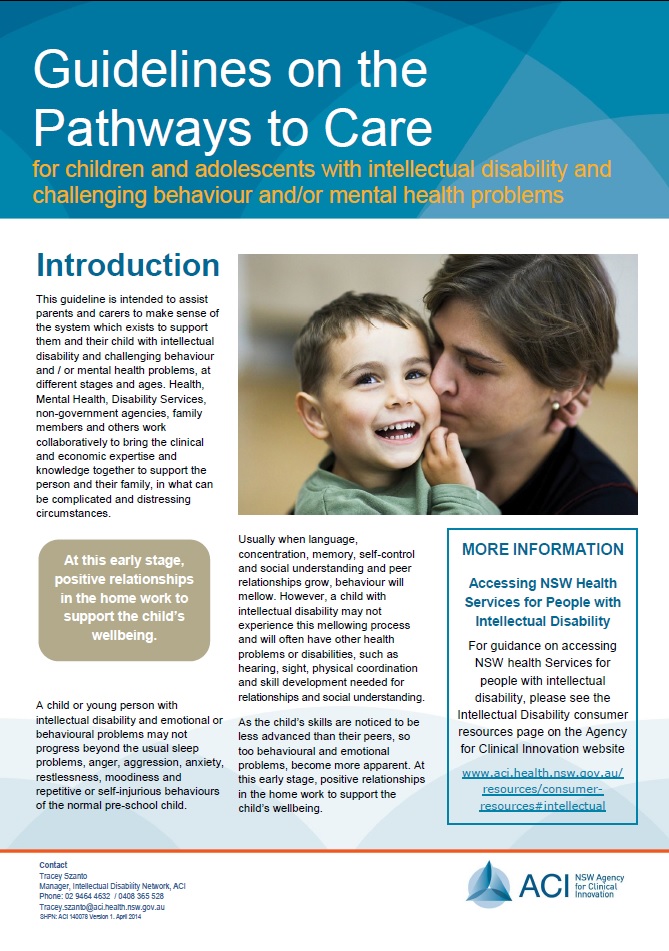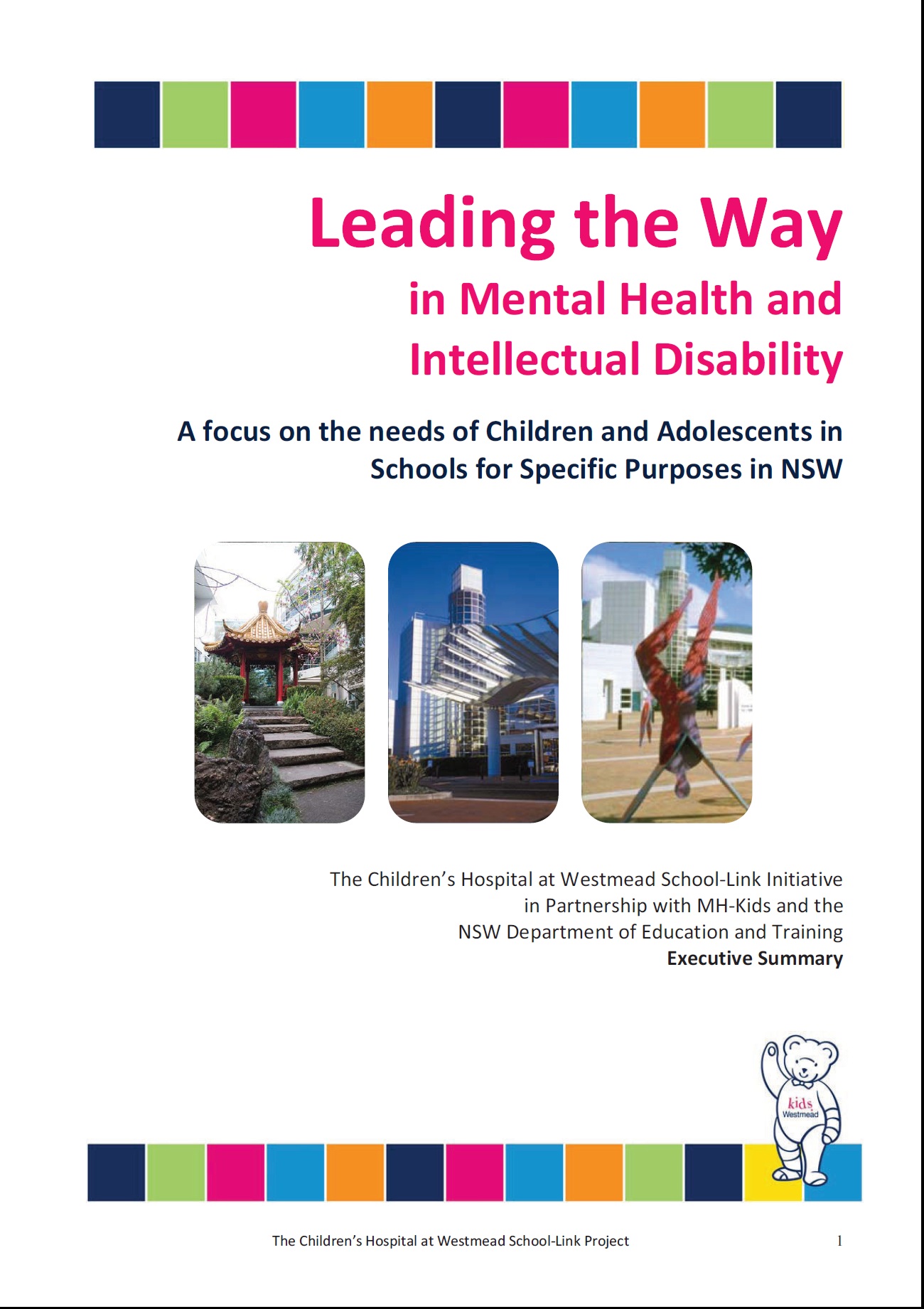Mental Health of Children and Adolescents with Intellectual and Developmental Disabilities: A Framework for Professional Practice
Edited by David Dossetor, Donna White and Lesley Whatson
About the book
By clinicians, for clinicians
Release date: 2011
View the books' table of contents or skip to the free chapter PDF's below
Children and adolescents with intellectual and developmental disabilities are at high risk of co-morbid emotional, behavioural, and psychiatric problems that may further reduce their functional abilities. For the clinicians who support them and their families, meeting the needs of children and adolescents with intellectual and developmental disabilities and mental health problems is challenging.
In this book, clinicians who work with young people with intellectual and developmental disabilities and mental health problems will find a comprehensive framework for how their complex developmental, emotional and behavioural needs might best be addressed. Relevant of biological, developmental, family, educational, social, and cultural factors are integrated. The evolution of developmental sequence is seen as vital to understanding the mental health problems of children and adolescents with intellectual and developmental disabilities. This view informs multi-dimensional assessment of behaviour, and addresses conceptual confusion in defining behaviour problems, developmental disorders (including developmental psychiatric disorders such as ADHD and autism spectrum disorders), mental disorders, and serious mental illnesses. Evidence-based interventions to promote skill development and mental health in young people with intellectual and developmental disabilities are described. A model for how interdisciplinary and multi-agency collaboration and co-ordination might be facilitated is outlined. Parents’ perspectives are also presented. Fundamentally, though, this is a book
All clinicians and other professionals who work to improve mental health outcomes and quality of life more generally for young people who have intellectual and developmental disabilities – paediatricians, child psychiatrists, psychologists, speech pathologists, occupational therapists, social workers, behaviour clinicians, counselors, teachers, agency managers, among others – will find this book invaluable.
Free Chapters
Please find below the table of contents with PDF versions of the individual chapters. We hope these can benefit learning and professional practice.
PART I FOUNDATIONS
Chapter 1
Aiming for a quality of life: What makes for a 'good enough' life for a child or youth with intellectual disability and their family?
PDF by David Dossetor
Chapter 2
A common language for understanding intellectual disability, development, emotions and behaviour
PDF by Teena Caithness and Emma MooreChapter 3
Structured assessment of mental health problems in children and adolescents with intellectual disabilities
PDF by Louise A Ellis and Stewart L EinfeldChapter 4
A paediatrician's approach to the assessment of a child with intellectual disability or autism
PDF by Joseph MacdessiChapter 5
Intellectual disabilities and multicultural issues
PDF by Hadia Baassiri and Louisa CarrollPART II FOCUS ON CARERS AND FAMILIES
Chapter 6
Breaking the news of diagnosis: Facilitating adjustment and acceptance
PDF by Natalie Silove
Chapter 7
Children with developmental disability: Is providing care a burden?
PDF by Jacqueline SmallChapter 8
Promoting parent readiness for change: A motivational interviewing approach
PDF by Lesley Whatson and Wendy GriceChapter 9
CBT for carers of children with intellectual disability and challenging behaviour: Two cases
PDF by Cal PatersonChapter 10
Brothers and sisters with a disability: Rewarding or challenging?
PDF by Jacqueline Small
Chapter 11
Understanding and responding to challenging behaviour: Valuable contributions from attachment theory
PDF by Anders Hansson
Chapter 12
Challenging behaviour and change in intellectual disabilities: Family therapy, families and the wider system
PDF by Paul Rhodes and Lesley Whatson
Chapter 13
Parents' perspectives
PDF by Louisa Carroll, Kate Tye. Karen Ollerenshaw, Yasemin Esri, and Judy Brewer
PART III INTERVENTIONS TO PROMOTE SKILL DEVELOPMENT
Chapter 14
Using a sensory diet to mediate behaviours of concern and to increase children's participation in daily activities
PDF by Lucinda Mora and Chris ChapparoChapter 15
Communication for life: Promoting communicative competence for mental health and well-being
PDF by Donna WhiteChapter 16
Building life skills in children with intellectual disabilities
PDF by Victoria GrahameChapter 17
Developing emotion-based social skills in children with autism spectrum disorder and intellectual disability
PDF by Belinda J RatcliffeChapter 18
Promoting healthy sexual lives for young people with learning difficulties
PDF by Cheryl Jones and Jane ChiversChapter 19
Transition: More than an event
PDF by Debra Corfield and Kate BrierleyPART IV INTERVENTIONS TO PROMOTE MENTAL HEALTH
Chapter 20
Mental illness and intellectual disability: The concepts, the evidence and the clinical skills
PDF by David DossetorChapter 21
Promoting resolution and safety: A case study example
PDF by Lesley Whatson, Debra Corfield and Brett OwensChapter 22
Modifications of cognitive behaviour therapy and counselling for individuals with intellectual disabilities
PDF by Victoria GrahameChapter 23
The regulation of arousal in intellectual disability
PDF by Bruce W ChenowethChapter 24
Psychopharmacology: The use of medication to treat challenging behaviour in children and adolescents
PDF by Anthony A Zehetner
PART V INTEGRATION OF SERVICE SYSTEMS
Chapter 25
A service model for the mental health needs of children and adolescents with intellectual disability
PDF by David DossetorChapter 26
A special school community: An inclusive setting for addressing the mental health needs of students with an intellectual disability
PDF by Jodie A Caruana, Barbara Fleming, Hebah Saleh, Helen Goltzoff and David DossetorChapter 27
The community clinician and interagency collaboration
PDF by Mary Ellen Burke, Meredith A Martin and Garry M Dezilva






